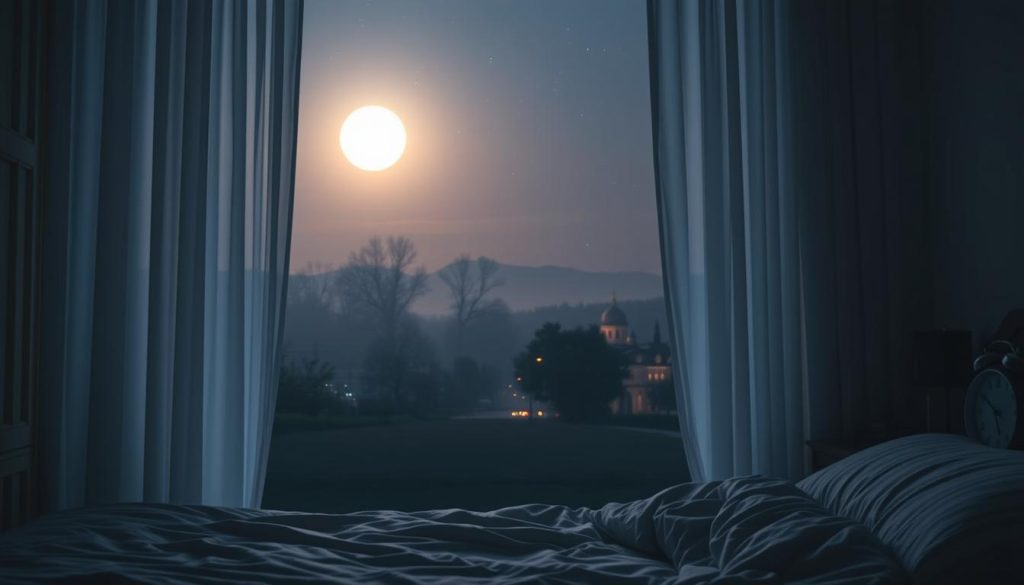Exploring my circadian rhythm shows its big role in my sleep and health. This internal clock runs on a 24-hour cycle. It’s affected by things like light and noise around me.
Learning about these factors helps me improve my sleep and daily life. I look at how natural and artificial light impact me. I also see how noise affects my rest. This helps me find ways to sleep better and stay healthy.
Understanding the Basics of Circadian Rhythm
Circadian rhythms are amazing processes that keep our bodies in sync with nature. They work on a 24-hour cycle, controlled by a clock in our brain. Knowing about circadian rhythms helps us see how light affects our sleep and health.
What is Circadian Rhythm?
A circadian rhythm is the body’s natural cycle of changes. It affects sleep, metabolism, and hormone release. This internal clock is set by the light and darkness around us, helping our body function right.
My daily life shows how my body follows these natural signals. It tells me when to be awake and when to rest.
How Circadian Rhythm Affects Sleep Patterns
The link between circadian rhythms and sleep is strong. My energy changes with the light and dark, making me more alert in the day and sleepy at night. Problems with this clock, like irregular sleep or too much artificial light, can cause sleep disorders and tiredness.
People who work nights or travel a lot often find it hard to adjust. This can harm their health. The role of these rhythms in our well-being is huge.

| Aspect | Circadian Rhythms | Impact of Disruption |
|---|---|---|
| Sleep Patterns | Regular sleeping and waking times | Insomnia or excessive daytime sleepiness |
| Metabolism | Optimal processing of food | Weight gain and diabetes risk |
| Mood Regulation | Stable emotional states | Increased anxiety and depression |
| Hormonal Balance | Timely hormone release for functions | Irregularities leading to various health issues |
The Role of Light in Circadian Rhythm
Light is key in setting my circadian rhythm. Natural and artificial light affect my body’s internal clock differently. Knowing these differences helps me get better sleep and feel better overall.
Natural Light vs. Artificial Light
Natural light, like sunlight, is crucial for my circadian rhythm. Morning sunlight tells my body it’s time to wake up. It helps regulate hormones like cortisol and melatonin.
Artificial light, especially blue light from screens, can mess with my sleep. It can stop melatonin production. Too much artificial light can mess up my circadian rhythms, making it hard to sleep well.
Strategies for Maximizing Natural Light Exposure
To improve my well-being, I focus on getting more natural light. Here are some tips I use:
- Spend time outdoors: I go for walks, especially in the morning, to get natural light.
- Open curtains and blinds: I keep my home bright by opening curtains and blinds during the day.
- Avoid screens before bedtime: I cut down on screen time at night to avoid artificial light and get ready for sleep.
- Utilize light therapy boxes: In dark months, I use light therapy boxes to get more light.

Impact of Noise on Sleep and Well-Being
Noise pollution can really mess with your sleep and health. Knowing what noises disrupt sleep helps me make my bedroom quieter. I’ll talk about common noise sources and how to keep your sleep area quiet.
Types of Noise That Disrupt Sleep
Many sounds can ruin a good night’s sleep. It’s key to know where these noises come from. Here are some usual troublemakers:
- Urban Sounds: Traffic, sirens, and construction noises are common in cities.
- Electronic Devices: Alerts from phones, tablets, and TVs can wake you up.
- Household Disturbances: Sounds from appliances, pets, and home activities can also disrupt sleep.
Tips for Creating a Quieter Sleep Environment
Creating a quiet space for sleep is crucial for good rest. Here are some tips:
- White Noise Machines: These devices can block out loud noises, making the sound environment more even.
- Utilizing Earplugs: Earplugs can stop sudden loud noises from waking you up.
- Soundproofing Techniques: Sealing gaps and adding heavy curtains can reduce outside noise.
Using these strategies can make your nights quieter and more restful. A better sleep environment can improve your health and daily life.
| Type of Noise | Impact on Sleep | Mitigation Strategy |
|---|---|---|
| Urban Sounds | High likelihood of sleep disruption | White noise machines |
| Electronic Devices | Interrupts sleep through notifications | Utilizing earplugs |
| Household Disturbances | Causes wakefulness and anxiety | Soundproofing techniques |
Circadian Rhythm and Environmental Factors
Understanding how my environment affects my sleep is key. Things like temperature, humidity, and air quality shape my day and health. Knowing this helps me make choices that improve my sleep.
How Environmental Factors Influence Circadian Rhythm
My environment greatly impacts my body’s internal clock. For example, temperature changes can affect melatonin levels, which is crucial for sleep. Keeping a cool room can help me sleep better.
Air quality is also important. Bad air can make it hard to relax at night. The best conditions help me relax and sleep well, following my natural rhythm.
The Connection Between Lifestyle and Sleep Quality
My lifestyle choices are as important as my environment for sleep. Exercise can make me sleep faster and deeper. But, watching screens late at night can mess with my rhythm.
What I eat also matters. Eating big meals before bed can make it hard to sleep. By changing my habits, I can improve my sleep and rhythm.

| Environmental Factor | Influence on Circadian Rhythm | Tips for Improvement |
|---|---|---|
| Temperature | Affects melatonin release | Keep room cooler at night |
| Air Quality | Influences comfort and relaxation | Use air purifiers |
| Light Exposure | Regulates sleep-wake cycle | Limit screens before bed |
| Noise Levels | Interrupts sleep stages | Use white noise machines |
| Lifestyle Choices | Directly affects sleep quality | Establish a consistent routine |
Adapting to Environmental Changes
Travel and seasonal changes can mess with our sleep. Moving to different time zones and dealing with changing light is tough. It’s key to find ways to adjust to these changes to sleep better and feel good.
Traveling and Adjusting Your Circadian Rhythm
Traveling means adjusting to a new time zone. Jet lag can make you feel off and tired. To beat this, I start adjusting my sleep schedule before I leave.
I also try to get some sunlight when I arrive. This helps my body adjust faster to the new time.
Seasonal Changes and Their Impact
Seasons can affect how we feel and sleep. With less daylight in winter, I need to take action. Bright light therapy in the morning helps me stay alert and fight off the winter blues.
Doing things outside during the day also helps keep my sleep cycle healthy all year.
| Strategy | Purpose | Best Practice |
|---|---|---|
| Gradual Schedule Adjustment | Ease transition to a new time zone | Shift bedtime by 30-60 minutes |
| Light Exposure | Signal to the body it’s time to wake | Seek sunlight or use a lightbox |
| Outdoor Activities | Boost mood and manage seasonal changes | Spend time outside in natural light |
| Bright Light Therapy | Combat winter blues | Use a light therapy box in the morning |
Improving Sleep Hygiene for Better Circadian Rhythm
To improve my sleep, I stick to a consistent sleep schedule. Going to bed and waking up at the same time every day is key. This helps my body know when it’s time to sleep, making it easier to fall asleep and wake up.
Creating a calming bedtime routine is also helpful. I enjoy relaxing activities like reading or meditating before bed. These activities tell my brain it’s time to relax, preparing me for a good night’s sleep. A comfortable sleep environment, free from distractions, also helps improve my sleep.
Using techniques that support deeper sleep is crucial. Keeping the bedroom cool and using blackout curtains can improve sleep quality. By making my sleep space optimal and promoting relaxation, I can enjoy better health and a stronger circadian rhythm.

